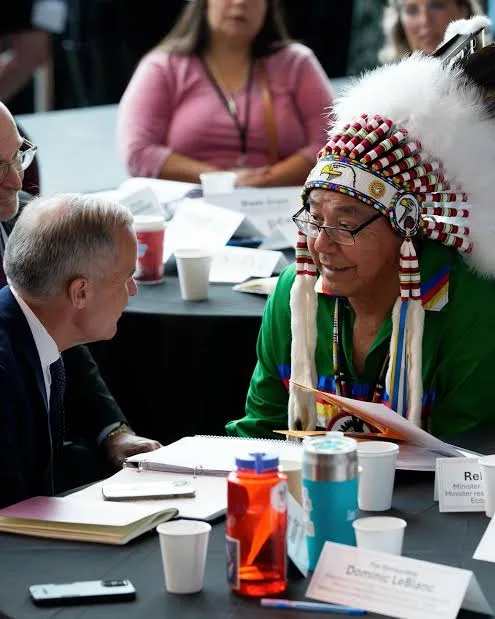Gatineau, Quebec – July 17,2025
A highly anticipated summit between Prime Minister Mark Carney and First Nations leaders on Thursday, July 17th, concluded with many Indigenous representatives expressing deep skepticism and renewed concerns over Bill C-5, the “One Canadian Economy Act.” While the Prime Minister championed the legislation as a path to prosperity for all Canadians, including Indigenous peoples, chiefs from across the country slammed the bill for allegedly undermining Indigenous rights, sidestepping proper consultation, and fast-tracking resource and infrastructure projects without their free, prior, and informed consent.
Bill C-5: Fast-Tracking Projects for a “United” Economy
Bill C-5, which recently received Royal Assent, aims to dismantle interprovincial trade barriers and, more controversially, to streamline federal approvals for major infrastructure and resource projects deemed to be in the “national interest.” These projects, which could range from mines and pipelines to electricity grids, would benefit from an accelerated process, aiming to reduce federal approval timelines from five years to two. The government asserts that this legislation is crucial for bolstering Canada’s economy, strengthening autonomy, and countering economic threats.
Prime Minister Carney, in his opening remarks at the summit held at the Museum of History in Gatineau, emphasized his desire to “listen” to First Nations concerns and pledged that the law would enable projects to be “built in the right way” with adequate consultation. He stressed that Bill C-5 is “enabling legislation” and that no specific national-interest projects have yet been identified for fast-tracking. # Bulldozing” Rights and Lack of Consent
Despite the Prime Minister’s assurances, many First Nations leaders arrived at the summit with tempered optimism, if not outright cynicism. Their concerns stem from the hurried passage of Bill C-5 through Parliament, which they contend largely bypassed meaningful consultation with Indigenous communities.
Several chiefs voiced strong opposition, arguing that the bill gives the federal cabinet sweeping powers to approve projects with little oversight and can sidestep existing environmental laws, including the Environmental Protection Act. They highlighted that while the bill’s preamble references the government’s commitment to work with Indigenous peoples, its operative clauses lack any binding requirement for consultation seeking free, prior, and informed consent (FPIC) – a principle enshrined in the United Nations Declaration on the Rights of Indigenous Peoples (UNDRIP). An amendment to include FPIC, proposed by Mi’kmaw Senator Paul Prosper, was ultimately voted down in the Senate.

Chief Vernon Watchmaker of Kehewin Cree Nation in Alberta, speaking at a press conference on Thursday afternoon, vehemently stated that Bill C-5 “centralizes power in Ottawa, lets cabinet overwrite environmental laws and ignore treaty and inherent rights. That is not modernization. That is colonization in 2025.”
Other leaders echoed this sentiment, arguing that the bill reduces their rights to consultation and fails to respect their decision-making and jurisdiction over ancestral lands. Nine First Nations in Ontario have already initiated legal proceedings to challenge both the federal Bill C-5 and a similar provincial Bill 5, arguing that both pieces of legislation were created without First Nations input and proper consultation.
Skepticism and Demands for Repeal
Many First Nations leaders expressed dissatisfaction with the summit’s format, which was largely closed to the public and media, and where chiefs were reportedly asked to submit questions in advance or comment on pre-determined lists. Some leaders walked out of the summit by mid-afternoon, expressing frustration with the perceived lack of genuine engagement.
Former National Chief of the Assembly of First Nations (AFN), Ovide Mercredi, directly addressed Prime Minister Carney, stating that asking First Nations to have faith in the legislation despite it causing fear was unacceptable. AFN National Chief Cindy Woodhouse Nepinak, while giving the Prime Minister the “benefit of the doubt,” reiterated that a summit should have been held before the bill passed.
While Prime Minister Carney stressed that the meeting was the “first step in a process” and pledged to launch a “regional dialogue and consultation process,” many First Nations leaders are demanding a full repeal of Bill C-5 and a commitment to restart the process with proper, nation-to-nation consultation that truly upholds their constitutional rights and the principles of UNDRIP. The ongoing legal challenges and widespread Indigenous opposition suggest that the implementation of the “One Canadian Economy Act” will face significant hurdles and continued resistance.
